Overview
1. Background / outline
Until now, JICA has provided training programs as a part of technical cooperation in various fields. In order to strengthen a network among the target countries in respective fields, JICA established a new long-term training program, called “SDGs Global Leader” to foster young/middle bureaucrats, academicians and leading human resources in various fields of target countries who will make influence on policy making processes of their countries or will contribute to socioeconomic development in near future.
Applicants may select the university, to which he/she wishes to apply, from the universities, which have concluded an agreement on accepting JICA participants on the condition that the candidate passes the entrance examination.
Proposed research topics will be the one that contribute to the Government policy for the sustainable development such as administration/public policy, finance, international politics, regional research, business, international trade/investment, disaster risk reduction, maritime issues and so on.
In addition to the programs in the master’s and Ph.D. courses, the activities such as short-term program to learn the Japanese Development Experience, networking seminar, and/or internship program will be planned in order to enrich the participants’ academic and personal experience of their courses of studies at the universities.
2. Objectives
1. To develop high-level human resources who would contribute to appropriate policy decisions and its implementation for tackling political and developmental issues in respective fields.
2. To establish and maintain mid and long-term good relations between the target countries and Japan.
3. Target Participants
Applicants must satisfy the following requirements:
- Current Duties:
- Young or middle Government official, prospective academics, personnel who are expected to contribute policy formulation and/or implementation for tackling sustainable developmental issues to mainly in the fields of public policy / administration and economics.
- Nationality:
- Citizen of the following target countries
- Age:
- Less than forty (40) years old in principle
- Educational Background:
- Have a Bachelor Degree or Master Degree
- Language:
- Adequate English skills both in written and oral communication to complete the master’s and/or Ph.D. courses.
- Others:
- Applicants must not be receiving nor planning to receive another scholarship during the program.
Target countries
| Southeast Asia | Cambodia, Indonesia, Laos, Malaysia Myanmar, Philippines, Thailand, Timor-Leste, Vietnam |
|---|---|
| Pacific | Cook Islands, Fiji, Kiribati, Marshall Islands, Federated States of Micronesia, Nauru, Niue, Palau, Papua New Guinea, Samoa, Solomon Islands, Tonga, Tuvalu and Vanuatu |
| South Asia | Bangladesh, Bhutan, Maldives, Nepal, Pakistan, Sri Lanka |
| East and Central Asia | Mongolia, Tajikistan, Georgia |
| Latin America and the Caribbean* | Jamaica, Ecuador, El Salvador, Dominican Republic, Honduras, Mexico, Dominica, Guatemala, Cuba, Belize, Chile, Peru, Costa Rica, Brazil, Paraguay |
| Middle East / Europe | Iran, Serbia, North Macedonia |
| Africa | 49 countries (Sub-Saharan Africa) |
*Target countries for Latin America and the Caribbean vary depending on each fiscal year.
For more information, please contact the JICA overseas office in your country.
4. Number of Participants / Duration
JFY2019: 56 participants (Master’s Program: 43, PhD Program: 13)
In principle, 2 years for Master’s Program and 3 years for Ph.D. Program (It depends on each program offered by universities)
5. Expenses to be borne by JICA
Under the JICA Long-term Trainee Allowance standards, JICA will cover expenses and allowances to participants accepted for the program. A payment amount of the living allowance will be calculated according to the Japanese Government (MEXT) Scholarship standards. The grant that supports your research, such as the purchase of books or necessary equipment, participation fees for academic conferences, research trips, etc. can be also provided by JICA. Note that the payments (e.g. for tuition, research support expenses, and school support expenses) will not be paid to the training participants themselves, but directly to the university or other relevant institutions.
Applicants are nominated by each country’s government, and then approved by JICA. After this procedure, screening will be conducted at the proposed universities. Applicants must pass University’s regular admission procedures including examinations to enter the program.
| October | Application information are distributed from the government/institute. |
|---|---|
| November | Application deadline to JICA First Screening at JICA Overseas office |
| December | Pre-screening by universities |
| January | Results notification of the pre-screening |
| February-April | Official application to each university |
| June | Results notification of the official application →Notification of Final results for the scholarship |
| July | Preparation for departure |
| August | Pre-orientation at JICA Overseas office |
| September | Departure |
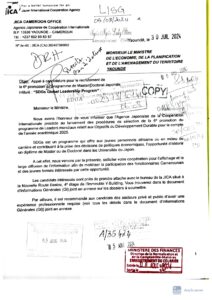
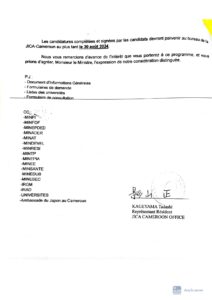
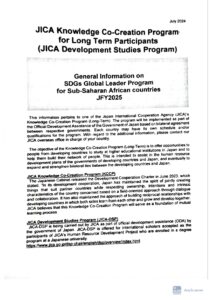
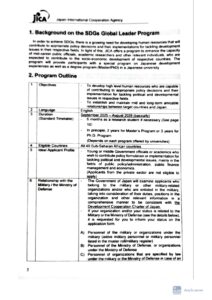
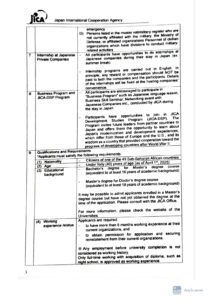
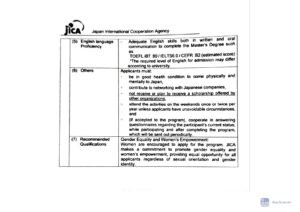
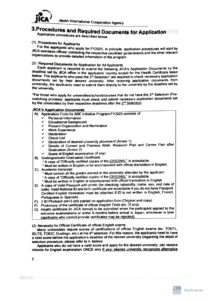
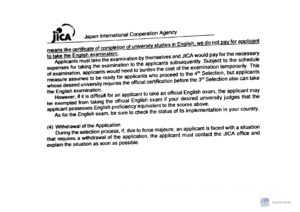
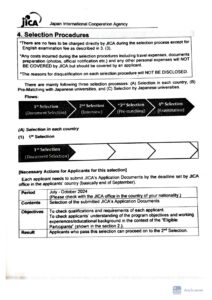
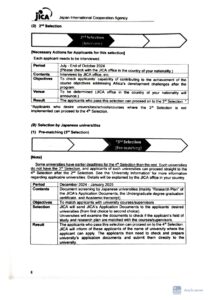
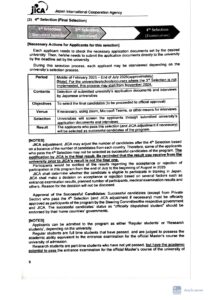
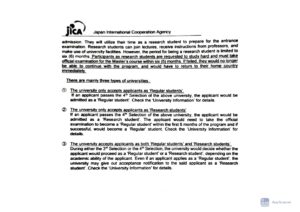
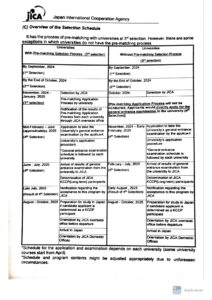
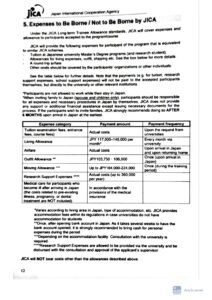
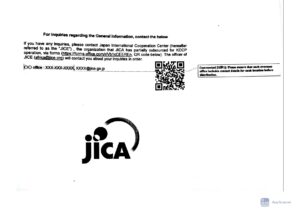
Check our scholarship finder for more scholarships
Do you want to stay current with the job market by being informed about the latest job opportunities? Use this link to join our WhatsApp job group;

